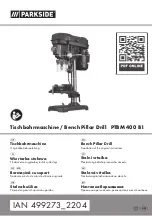
5
ENGLISH
b. Do not use the power tool if the switch
does not turn it on and off.
Any power tool
that cannot be controlled with the switch is
dangerous and must be repaired.
c. Disconnect the plug from the power
source and/or the battery pack from
the power tool before making any
adjustments, changing accessories, or
storing power tools.
Such preventive safety
measures reduce the risk of starting the
power tool accidentally.
d. Store idle power tools out of the reach
of children and do not allow persons
unfamiliar with the power tool or these
instructions to operate the power tool.
Power tools are dangerous in the hands of
untrained users.
e. Maintain power tools. Check for
misalignment or binding of moving parts,
breakage of parts and any other condition
that may affect the power tools operation.
If damaged, have the power tool repaired
before use.
Many accidents are caused by
poorly maintained power tools.
f. Keep cutting tools sharp and clean.
Properly maintained cutting tools with sharp
cutting edges are less likely to bind and are
easier to control.
g. Use the power tool, accessories and
tool bits etc. in accordance with these
instructions, taking into account the
working conditions and the work to
be performed.
Use of the power tool for
operations different from those intended could
result in a hazardous situation.
5. Battery tool use and care
a. Recharge only with the charger speci
fi
ed
by the manufacturer.
A charger that is
suitable for one type of battery pack may
create a risk of
fi
re when used with another
battery pack.
b. Use power tools only with speci
fi
cally
designated battery packs.
Use of any other
battery packs may create a risk of injury and
fi
re.
c. When battery pack is not in use, keep
it away from other metal objects, like
paper clips, coins, keys, nails, screws, or
other small metal objects, that can make
a connection from one terminal to another.
Shorting the battery terminals together may
cause burns or a
fi
re.
d. Under abusive conditions, liquid may be
ejected from the battery; avoid contact.
If contact accidentally occurs,
fl
ush with
water. If liquid contacts eyes, additionally
seek medical help.
Liquid ejected from the
battery may cause irritation or burns.
6. Service
a. Have your power tool serviced by
a quali
fi
ed repair person using only
identical replacement parts.
This will
ensure that the safety of the power tool is
maintained.
Additional power tool safety warnings
Warning!
Additional safety warnings for
drills
♦
Use auxiliary handles supplied with the
tool.
Loss of control can cause personal
injury.
♦
Hold power tool by insulated gripping
surfaces when performing an operation
where the cutting accessory may contact
hidden wiring.
Cutting accessory contacting
a “live” wire may make exposed metal parts
of the power tool “live” and could give the
operator an electric shock.
♦
Hold power tool by insulated gripping
surfaces, when performing an operation
where the fastener may contact hidden
wiring.
Fasteners contacting a “live” wire may
make exposed metal parts of the power tool
“live” and could give the operator an electric
shock.
♦
Use clamps or another practical way to
secure and support the workpiece to
a stable platform.
Holding the work by hand
or against your body leaves it unstable and
may lead to loss of control.
♦
Before drilling into walls,
fl
oors or ceilings,
check for the location of wiring and pipes.
♦
Avoid touching the tip of a drill bit just after
drilling, as it may be hot.
♦
The intended use is described in this
instruction manual. The use of any accessory
or attachment or performance of any
operation with this tool other than those
recommended in this instruction manual
may present a risk of personal injury and/or
damage to property.
Safety of others
♦
This tool is not intended for use by persons
(including children) with reduced physical,
sensory or mental capabilities, or lack of
experience and knowledge, unless they






































